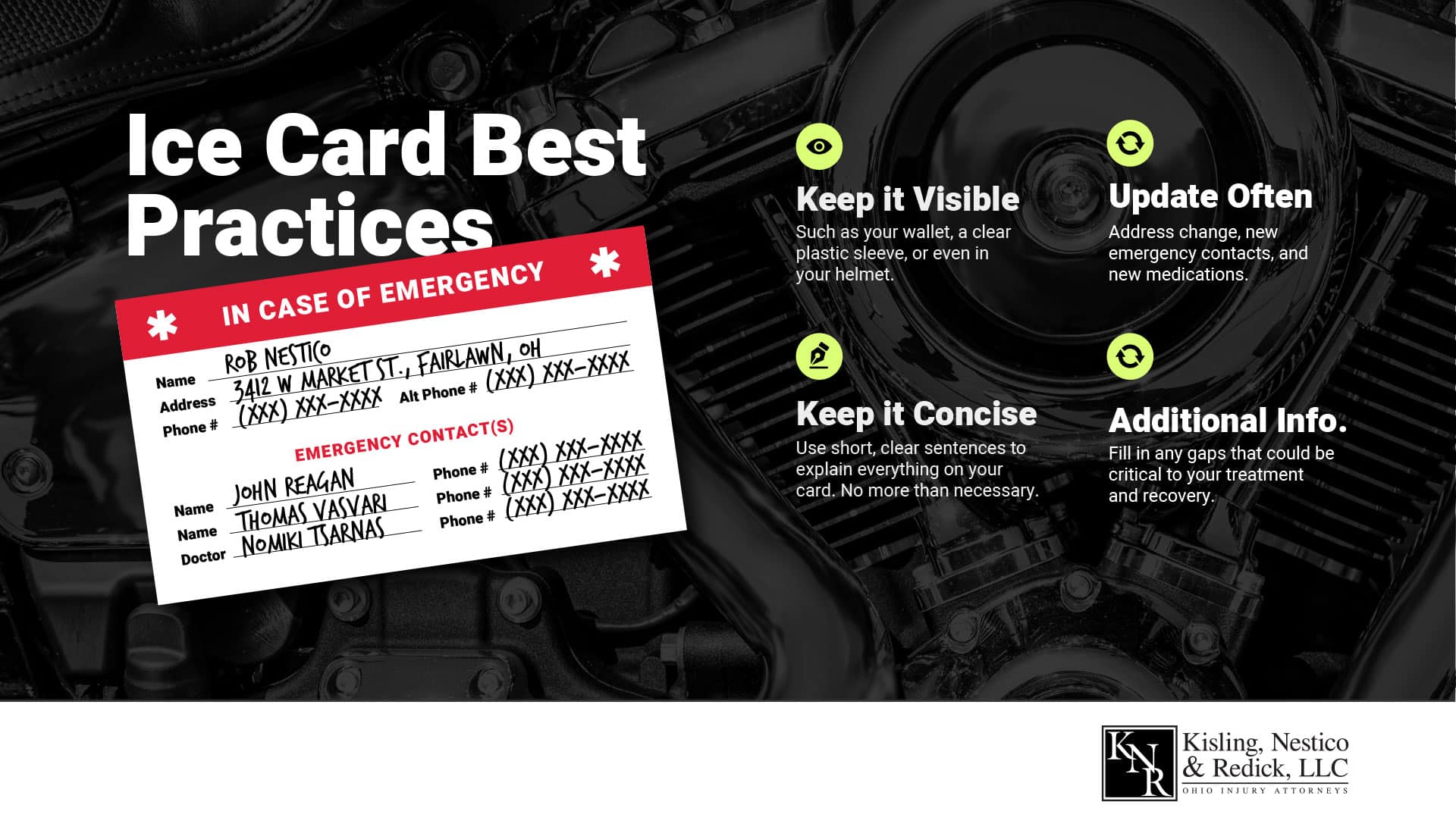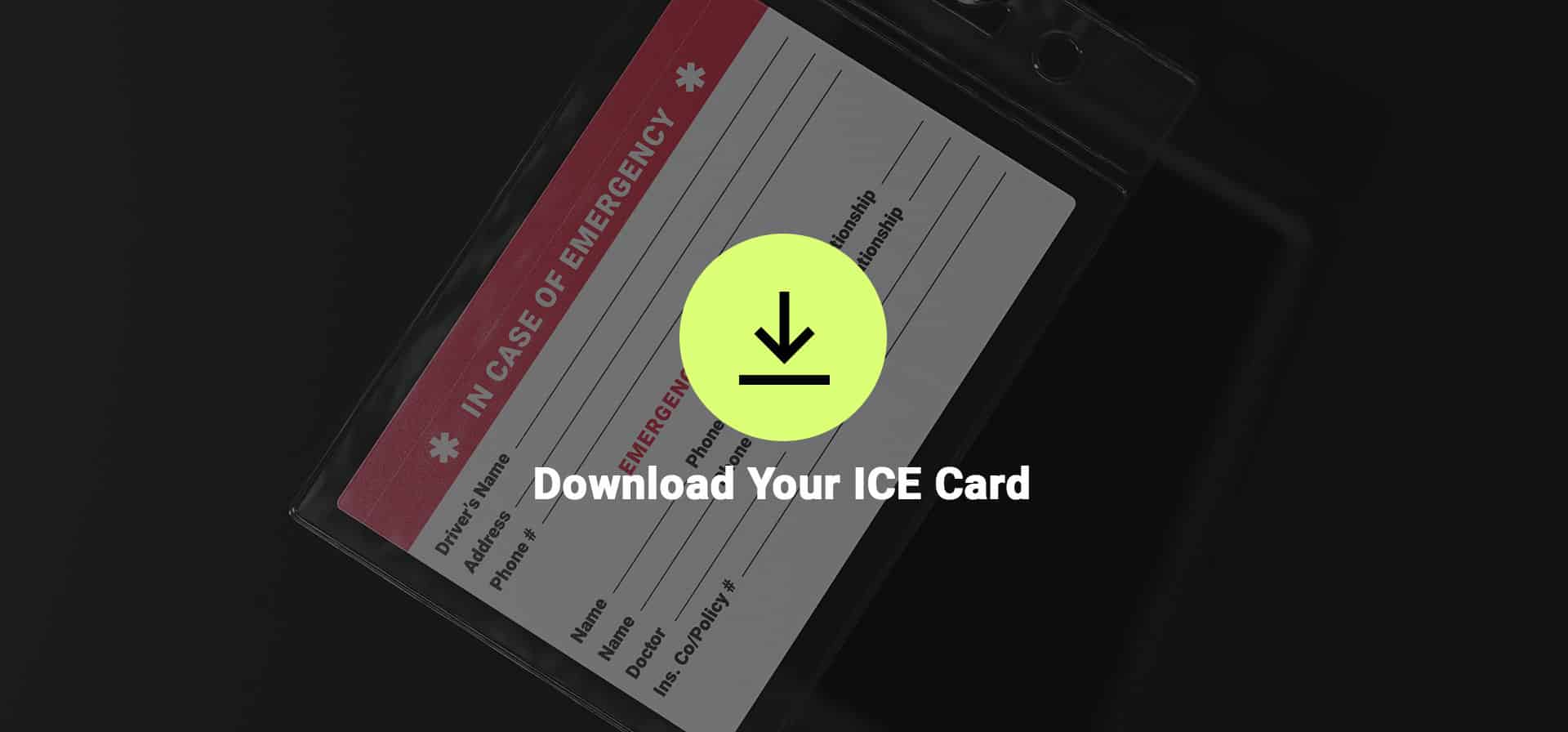Ohio Motorcycle Accidents: The Risk & Reality of Brain Injuries
Posted in: Motorcycle Accidents
KNR Legal Blog
Motorcycles are a lot of fun — and generally safe when used carefully. Unfortunately, accidents happen, and they can be catastrophic. Even the best motorcyclists can be in a terrible accident, especially one caused by another driver’s recklessness.
As a responsible motorcycle rider in Ohio, it’s best to be prepared, and an “In Case of Emergency” card can be a lifeline.
Also called an “ICE” card, this document can provide important information to bystanders, witnesses, or emergency services personnel in the event of a severe accident. If you’re riding with friends or family, they might be able to provide these details in a “worst case” scenario. However, any time you ride solo, you won’t be able to rely on them.
An ICE card can provide the critical info emergency responders need. By answering a few questions in advance, you can save valuable time even if you’re incapacitated. For instance, an ICE card can explain who should be alerted and what kind of treatment you want after a crash.
Your ICE card will cover the basics and have more detailed information for anyone needing it. Your card should list your name, home address, emergency contact information, and a backup contact, just in case.
You’ll also likely want to include your relationship to your emergency contact and provide permission to share medical information if they aren’t your next of kin.
Your card can also indicate any medical conditions, allergies, medications, or other relevant information affecting your treatment. If you can’t answer the questions from emergency medical providers, your card can save you from a dangerous situation.
Lastly, your ICE card should include your healthcare provider and insurance information.
When making your ICE card, here are some key points to remember.

An ICE card is a good step toward getting help after a crash. But it’s only effective if people can find it. Some people place it in their wallets, but you could also use a clear sleeve to keep the card in a place that’s more accessible. Some motorcyclists put their ICE info in their helmets.
While many riders think including their ICE information on their cell phones is good enough, they often don’t consider they might be unable to unlock their phones in an emergency. You can keep it there but have a physical copy as a backup.
Your card should not be too big to fit in your wallet. That means you’ll need to keep the info brief. Use short, clear sentences to explain everything on your card. You don’t need more than a few words to describe your relationship with your primary emergency contact.
You can put the most vital information at the beginning of the document. That way, anyone helping you after a crash can prioritize that information, and once there’s some calm, they can look for more details.
You need to keep your emergency contact card as accurate as possible. You might have an address change, new emergency contacts, or even different medications than when you originally made the card. Keeping your card up to date can only benefit you.
Suppose you were in a crash when it was inaccurate: missing that emergency contact information could delay your treatment or keep your family from knowing what’s happened to you.
Your card could detail anything else an emergency responder should know in the case of an accident. That might be instructions like which networks to avoid for treatment, where other important documents you have, or if you have any medical devices medical providers should know about.
If your emergency contact can’t arrive before you’re taken away for medical treatment, then your ICE card can fill in any gaps that could be critical to your treatment and recovery.
Your ICE card likely won’t be used as evidence in a personal injury claim or lawsuit. But, your card could be invaluable for getting the timely treatment, clear communication, and proper documentation you’ll need if you file an insurance claim if a negligent party caused the motorcycle crash that left you incapacitated.
In addition to proper medical care, an ICE card can provide your emergency contact with enough notice to get started on a possible case. They can go to the crash scene for photos, collect witness details, or get the responding officer’s number for the report once it’s completed. A loved one may even have the foresight to contact a personal injury lawyer on your behalf.
Motorcycle crashes are among some of the most dangerous motor vehicle accidents. You may not be able to get help on your own, or you may not be able to help emergency responders when they arrive. An ICE card can help you get treatment, but you’ll still need help pursuing compensation. An Ohio motorcycle accident lawyer at KNR can help you complete a claim.
We hope you’re never in a collision, but you can download your own KNR “In Case of Emergency” card here.

If you ever find yourself injured in an Ohio motorcycle accident due to another’s recklessness, you may be entitled to compensation for your various losses. Let our legal team review the details and help you pursue justice.
With millions recovered and thousands of injured Ohioans helped, call KNR today at 1-800-HURT-NOW to schedule a free consultation.